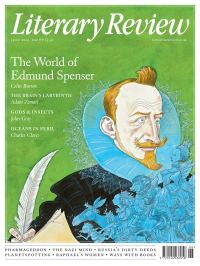Colin Burrow
Prince of Poets
Edmund Spenser: A Life
By Andrew Hadfield
Oxford University Press 640pp £25
Edmund Spenser was the greatest Elizabethan poet – and here ‘greatest’ means not just ‘best’ but also ‘biggest’. From 1579 he published poems which were designed to show that he was the heir of both Chaucer and Virgil, fusing English and classical traditions. These culminated in the publication in 1590 of the first three books of The Faerie Queene. This vast allegorical romance epic gave a Protestant and English form to a genre popularised by Ariosto’s Orlando Furioso and Tasso’s Gerusalemme liberata.
In 1591 Spenser was granted a pension of £50 a year by Queen Elizabeth. This was around three times the annual income of many schoolmasters. After his death in 1599 he was regularly described as England’s ‘arch-poet’ or ‘the prince of poets’. His body was interred next to Chaucer’s tomb

Sign Up to our newsletter
Receive free articles, highlights from the archive, news, details of prizes, and much more.@Lit_Review
Follow Literary Review on Twitter
Twitter Feed
Under its longest-serving editor, Graydon Carter, Vanity Fair was that rare thing – a New York society magazine that published serious journalism.
@PeterPeteryork looks at what Carter got right.
Peter York - Deluxe Editions
Peter York: Deluxe Editions - When the Going Was Good: An Editor’s Adventures During the Last Golden Age of Magazines by Graydon Carter
literaryreview.co.uk
Henry James returned to America in 1904 with three objectives: to see his brother William, to deliver a series of lectures on Balzac, and to gather material for a pair of books about modern America.
Peter Rose follows James out west.
Peter Rose - The Restless Analyst
Peter Rose: The Restless Analyst - Henry James Comes Home: Rediscovering America in the Gilded Age by Peter Brooks...
literaryreview.co.uk
Vladimir Putin served his apprenticeship in the KGB toward the end of the Cold War, a period during which Western societies were infiltrated by so-called 'illegals'.
Piers Brendon examines how the culture of Soviet spycraft shaped his thinking.
Piers Brendon - Tinker, Tailor, Sleeper, Troll
Piers Brendon: Tinker, Tailor, Sleeper, Troll - The Illegals: Russia’s Most Audacious Spies and the Plot to Infiltrate the West by Shaun Walker
literaryreview.co.uk